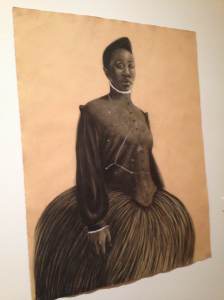
“The erotic is a resource within each of us that lies in a deeply female and spiritual plane, firmly rooted in the power of our unexpressed or unrecognized feeling.” – Audre Lorde
Quite a number of people within the past couple of weeks have basically told black women (and other women of color in general) that our voices, our bodies and any power we have –present, past or future — is not to be respected or honored. On several fronts we are attacked, from our erasure from mainstream feminism (#solidarityisforwhitewomen) to our erasure from racial discourse (#blackpowerisforblackmen). Even women who expect to be revered are treated trivially. Last week, hip-hop mogul Russell Simmons released a Harriet Tubman “sex tape” that he thought was suppose to be funny. Afrofuturists know Tubman as an icon in our spaces, just look at Chronicles of Harriet, Sanford Biggers, Elizabeth Hamilton, and Cauleen Smith. Yes, he took the video down, after he was quickly called out on it, and his apology was basically all bull, implying that we were too sensitive, and not the critique of the racially misogynist (or misogynoir) aspects of the video. For example, having Tubman seduce a white master matches the jezebel stereotype and reinforces notions of black women’s incapability of being raped. Additionally, it was the inaccuracy of the video to Tubman’s story and the reduction of a woman to degrading, pornographic sex. Now he wants to do a movie about Tubman. C’mon, please! Rather than waiting for that half-assed sorry that will be that film, below are some works that show greater respect for us. For the past few weeks, I have read and viewed works that spoke to me as a Black woman about us reclaiming our power in different situations.
The three works — two from Caribbean writers, Nalo Hopinkson’s Midnight Robber and Marie-Elena John’s Unburnable, and the other, a Cameroonian film, Jean-Pierre Bekolo’s Les Saignantes (The Bloodettes) — all explore stories of women who fight to overcome sexual oppression, sometimes even at the hands of other women, through a re-imagining of themselves and a reclaiming of feminine ancestral wisdom and bodies. One of the most striking parts that is similar in all three is the reliance of ancestral feminine wisdom and ritual, and ancestral women by the main characters, much like what we should do with Harriet Tubman. (*warning: spoilers coming*)
Midnight Robber tells the story of a strong-willed girl Tan-Tan who lives in a futuristic Caribbean society, Toussaint, governed by the Grand Nanotech Sentient Interface, or Grand Nansi’s Web (Granny Nanny). However, after her parents have a falling out and her father, Mayor Antonio, is jailed for fatally poisoning an opponent in a machete duel in attempt to get his wife back, Tan-Tan life changes for ever as her father takes her away to New Half-Way Tree, a land of exiles, to escape. Tan-Tan is forced to have to live in a new unfamiliar, non-modern land, but also now has to withstand sexual abuses of a father who uses Tan-Tan as his last way to keep control.
Not only does Hopkinson‘s book show different ways a woman can be, like Tan-Tan’s own mother, Ione, is not inherently maternal and shows Tan-Tan’s battles over becoming a mother herself, suggesting that motherhood is a choice not natural, but she also employs the Caribbean carnival mythology as a way for Tan-Tan to cope, a form of dissociative identity, and eventually regain her power and reunite all the sides of herself. The different Caribbean mythical figures, like douen, moko jumbie bird, and the rolling calf, become real in the New Half-Way tree, but the midnight robber and Granny Nanny are the most important to Tan-Tan’s well-being.
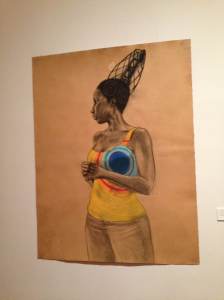
In the beginning of the story, her eshu device (a kind of implanted third eye) in her head tells her that the character of the midnight robber was only designated to men for a while back on Earth, yet on Toussaint she could be robber queen. The image of the powerful robber queen with her black cape or vest, black sombrero with skulls, holster, and red gator boots, is the one things that sticks with Tan-Tan throughout her journey in the New Half-Way Tree. When her father abuses her for the first time, her mind immediately splits into two, and she continues to experience the shame, guilt and low-esteem for what he did and the actions she took to protect herself. She only begins to lose that and find her strength in transforming into the myth of the anti-hero, robin hood-type character, the robber queen. As the robber queen, she takes her own past and instead conjures multiple legends of her own creation and seeks justice in the mistreatment of others. However, with a baby fathered by her father growing in her and a misdirected stepmother hunting after her, Tan-Tan has no choice at the end but to finally tell the real story, but in that she finally finds her freedom and reconciles herself. And all the while it is the spirit of Granny Nanny who is always searching for her and protecting her throughout the journey, as the narrator of the book. That feminine power is in he all along.
Although John’s book, Unburnable, the title based on the Adinkra symbol, hye won hye — “that which does not burn,” is not considered speculative, the foundation for the novel is similar to Hopkinson’s Midnight Robber in its inclusion of Caribbean carnival figures and mythology as well as mentioning Caribbean folk magic practices, like obeah. Also, like Midnight Robber’s Granny Nanny, there is a “grand” mother figure for the main character Lillian, named Maltida, who is a black maroon woman in Dominica, a holder of ancient wisdom, a healer, medicine woman and protector. She works much like the web system of Toussaint, as mentioned in the novel “… for her there could be no clear separation of the physical, the mental and the spiritual” (11).
As with Midnight Robber, motherhood is a conflicted space for the main character Lillian, who is dealing with years of mental illness affter suffering a mental breakdown learning about being adopted and learning about her family. In both books, motherhood is complicated by the effects of slavery and colonialism. For example, what does Africa as a mother mean to her descendants: “here in Dominica, the leftovers of African Religion, the form without substance, were inserted into ritualistic framework of Catholicism” (210). Like Granny Nanny, the spirit is felt, but not physically there. It is as said by Johnnie Wilcox about electricity in Invisible Man, “a body without organs.” The same can be said of Maltilda, Lillian’s grandmother, and Iris, her mother.
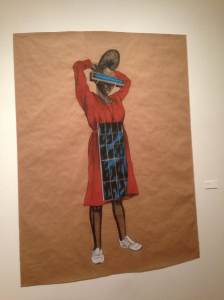
These two women are part of Lillian, but the Dominican society has denigrated and demonized them in their songs, and Lillian finds herself wanting to not only learn about them, but defend them. Her grandmother, Matilda, was hanged for allegedly murdering with obeah magic a creole upper class man John Baptiste who died of fright during a carnival masquerade. The older Baptiste had a relationship with Iris as a young girl, and after Iris publically embarrasses Baptiste’s family during carnival, she is physically assaulted and sexually assaulted with a glass bottle by Baptiste’s mother and family. As Midnight Robber, one of the characters, an anthropologist, notes how the tradition of the masquerade changes, allowing women to be part of it (143). The flying masquerade, in which Matilda is accused of being part of and using to bring death upon Baptiste, becomes almost an act of feminine justice against the abuses of a man, but then turned around by the main government as an act of injustice. The flying masquerade arches over the story to the end when Lillian, who is in search of the truth about her mother and grandmother, climbs up to the maroon village area in the hills and is contemplating suicide on a cliff. Lillian imagines transforming into something mythological, like Mama Glo (Dominica version of Mami Wata), or La Diablesse or even a soucouyant (a kind of succubus or vampire witch), all supernaturally powerful, sexual and dangerous in their own way. She compares her mother (considered a prostitute) and grandmother to the first two, but claims her own for the last. Although she may not find the truth of her grandmother’s innocence, she is connected in their legacy and accepts them and their lives outside of the boundaries of western morals about women.
The film, Les Saignantes, which I saw for the first time at The Future Weird film showcase is a futuristic film about a dystopic Cameroon society. The story follows two friends and prostitutes, Majolie and Chouchou, who execute a plan to overthrow a corrupt, patriarchal government after an SGCC agent dies during a sexual act. What is obvious in the film is how all of the women a subjugated to disrespect by the men in the society, but these two women want to create a different future for themselves and other women. A narrator repeats in different phrases how can different futures or different creations come into existence when one does not seem to be in sight.
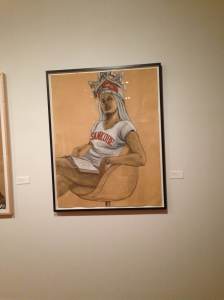
One answer is in the word that is repeated throughout – mevoungou (mevungu). Mevungu is a tradition of the Beti women of Cameroon, a secret ritual celebrating the clitoris and feminine power and means of protecting against evil forces (116). Bekolo reconstructs the ritual into a kind of awakening of supernatural powers and intelligence for the two women. Although the meaning of mevoungu is not explicit in the film or the motherly figures of the two women in the film seem to stand around silently detached and the audience is unsure of their purpose, their piercing presence is felt all over the film. The film does hint at its connection to these women realizing their strength in their minds and their vulvas, especially at the end when they do a dance and use a force coming from below to defeat a corrupt government official.
Derica, who curated the film screening, spoke about theme of the night as the mechanization and eroticization of bodies. The films included the process of breadmaking in colonial Kenya; a news story about a disabled marine who became a model, minimizing the war that cost him his limb; robots of Brixton’s references of Brixton protests of the 80s, the robots becoming a metaphor for the dehumanization of communities of color. But the film fights the capitalistic sexual mechanization through the spiritual, ritual power of mevungu. The ancient female ritual and spiritual wisdom is taken and transformed as possible means to help create a positive future for women of color.
Last Sunday, as I looked at the works from artist Robert Pruitt in his exhibition, Women, it reminded me of the need for us and others to honor our voices, our bodies and our fantastic powers that we use in our daily lives. We are so much more than how we are treated and we deserve much more.
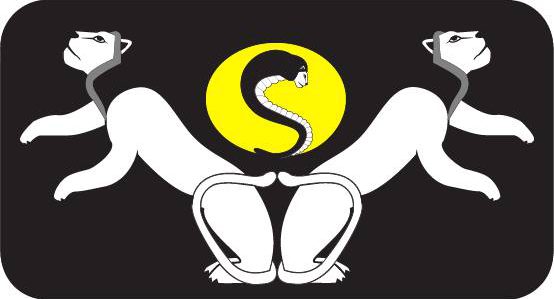
Great essay! I felt compelled to spread the word.
Thanks! 🙂
I am so thrilled I found this blog (through your essay on the Root “My Thing Is…)! Your whole site is inspiring. Nice to see I’m not alone or weird in my interest.
Thank you for supporting my blog! If you ever want to do a guest post or series, I welcome you and your thoughts!